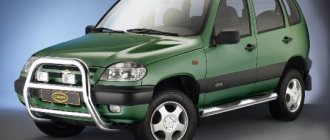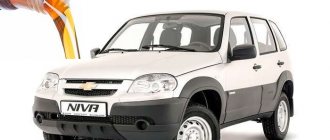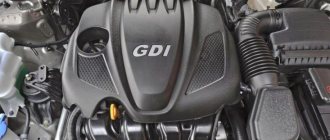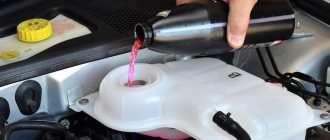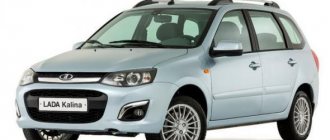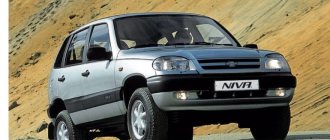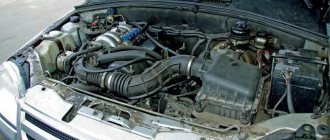Automobile: Renault Duster. Asks: Vladimir Shpakov. Essence of the question: Chevrolet Niva vs Renault Duster, which is better to buy?
Hello. I’m thinking about changing my car, I need a model that is not afraid of city potholes and can go out of town without any problems. I choose between Renault Duster and Niva Chevrolet. The Niva seems to be completely indestructible, which has been proven over the years, but the Duster also has only good reviews, and it’s prettier. What about breakdowns? Which one is cheaper to repair and maintain? Help me decide.
What to choose in the end
In comparing these two cars, it is difficult to find a winner, since both are designed not only for city driving, but also for serious off-road use.
Of course, it is worth realizing that each car has its own maximum capabilities that it cannot exceed. As for the Niva car, this is simply an excellent option for people who want to find a high-quality, inexpensive and fairly comfortable option for traveling out of town, fishing, hunting, and so on. If we talk about the French car, it is much more attractive in terms of comfort, it is more suitable for city driving, it corners much more smoothly, the gearbox works much better, and there are a large number of additional systems. The cost of the initial versions of the cars is approximately the same. Renault is 50-70 thousand rubles more expensive, but this is due to a much more powerful engine.
You need to choose based on your own needs, so it is simply impossible to say which option is more reliable and of higher quality.
Rivals or not
The first version of the Renault Duster appeared in 2009. The developers of this model like to repeat that their car was created on the B0 platform, which is a frameless chassis where the chassis elements are attached directly to the lower part of the body.
The first SUV VAZ-2121 was assembled in the socialist year of 1971. It was the world's first passenger car produced without a frame. In the conditions of a socially planned economy, when permission and approval were required for every sneeze, such design know-how was unheard of audacity. The winners are not judged. The outwardly angular and unremarkable SUV has become the best off-road vehicle in its class of cars. This was shown by tests conducted with the participation of Moskvich, LuAZ, UAZ, and Land Rovers. Tests were carried out on arable land with melted snow, in a sand pit after rain and other treacherous sections of roads. More often than not, only AvtoVAZ’s new product, which was in the testing stage, reached the finish line. In 1974, AvtoVAZ patented the name “Niva”.
Another three years, during which the designers refined their brainchild, turned out to be testing years for the new SUV. In April 1977, the SUV was put on the assembly line. Lada 2121 became the only Russian car exported to Japan. It is not difficult to guess that the Japanese took advantage of the achievements of the designers of the Volzhsky Automobile Plant.
The history of the glorious car can be continued, but the article has a different goal - to compare the legendary Niva with the Renault duster, the manufacturer of which will present an updated version in the new year. Having analyzed both crossover models, we will try to answer the question: which is better: Renault Duster or Niva.
Visual component
If we talk about the American car, then in comparison with the standard Niva it has undergone quite a lot of changes. First of all, it looks much better from a visual point of view. There are a lot more European accents here. The car's interior is designed in a classic style. There's nothing special here.
In the standard version of the car, only everything necessary is installed. The interior is lined with the simplest version of fabric, so in this regard, the domestic counterpart lags significantly behind its foreign counterpart. The dashboard looks quite good, although it clearly lacks quality elements.
Photo of Renault Duster interior
French Renault offered a much more stylish and high-quality version of the car. Very interesting and unusual elements appeared here, such as LED headlights, a high-quality bumper and larger wheels compared to the Niva. The car's interior also looks much more attractive, although in this case there is no particular luxury in the elements.
Both cars really deserve attention, and you should choose only based on your own preferences and taste.
Steering and chassis systems.
The steering system of two cars has an additional power steering system. But in Duster it is organized using electrical components, while in Niva it is hydraulics. This allowed Renault Duster to reduce the load on the engine, due to which it has increased efficiency. This also affected fuel consumption; Renault is more economical.
Chevrolet Niva has an independent suspension, which is mounted on parallel tags. This allows you to fully use the car not only in the city, but also off-road. Four transverse links provide good stability and help provide high ground clearance.
Renault Duster has an independent rear suspension - only in the all-wheel drive version. The front one is made similar to MacPherson strut, which is not very suitable for an SUV. This suspension is more optimized for urban driving style to overcome small snowdrifts and small holes.
Exterior appearance of renault duster and chevrolet niva
Both cars are in the budget class, which, one way or another, is reflected in their appearance.
However, Renault Duster looks much more attractive and modern. However, this is not surprising if we remember that the design of the Chevrolet Niva has remained virtually unchanged since 2002. But let's look at the exterior in more detail.
In 2022, Renault Duster underwent a planned restyling, during which the car received new front and rear optics, a modified false radiator grille and a more stylish plastic body kit.
The crossover profile sports blown wheel arches, a large glass area and roof rails. External dimensions of Renault Duster:
- length – 4.315 m;
- width – 1.822 m;
- height – 1.625 m;
- wheelbase length - 2.673 m.
Compared to the “French” model, the Chevrolet Niva looks a bit boring, and this despite the fact that the SUV underwent its last update in January of this year.
Also interesting: Renault Duster and Chevrolet Niva comparison of cross-country ability video
The “face” of the car is greeted by large head optics, a neat false radiator grille and a laconic front bumper, while the rear flaunts a hinged tailgate and laconic vertically positioned side lights.
The car's profile captivates with large wheel arches and a wide plastic trim that reliably protects the lower part of the side doors from damage. The external dimensions of the domestic “American” have the following parameters:
- length – 4.056 m;
- width – 1.8 m;
- height – 1.652 m;
- wheelbase - 2.45 m.
The Renault Duster's ground clearance is 205 and 210 mm for the front-wheel drive and all-wheel drive versions, respectively, but the Chevrolet Niva's ground clearance is noticeably higher - 240 mm, which allows one to count on better geometric cross-country ability.
Rivals or not
The first version of the Renault Duster appeared in 2009.
The developers of this model like to repeat that their car was created on the B0 platform, which is a frameless chassis where the chassis elements are attached directly to the lower part of the body. The first SUV VAZ-2121 was assembled in the socialist year of 1971. It was the world's first passenger car produced without a frame. In the conditions of a socially planned economy, when permission and approval were required for every sneeze, such design know-how was unheard of audacity. The winners are not judged. The outwardly angular and unremarkable SUV has become the best off-road vehicle in its class of cars. This was shown by tests conducted with the participation of Moskvich, LuAZ, UAZ, and Land Rovers. Tests were carried out on arable land with melted snow, in a sand pit after rain and other treacherous sections of roads. More often than not, only AvtoVAZ’s new product, which was in the testing stage, reached the finish line. In 1974, AvtoVAZ patented the name “Niva”.
Another three years, during which the designers refined their brainchild, turned out to be testing years for the new SUV. In April 1977, the SUV was put on the assembly line. Lada 2121 became the only Russian car exported to Japan. It is not difficult to guess that the Japanese took advantage of the achievements of the designers of the Volzhsky Automobile Plant.
The history of the glorious car can be continued, but the article has a different goal - to compare the legendary Niva with the Renault duster, the manufacturer of which will present an updated version in the new year. Having analyzed both crossover models, we will try to answer the question: which is better: Renault Duster or Niva.
Interior design of renault duster vs chevrolet niva
The interior of the Chevrolet Niva sends ours back to the end of the last century, and this applies not only to the dashboard, but also to the controls located on the central dashboard, including the interior climate control unit.
The quality of finishing materials is frankly low-cost, although the assembly and ergonomics are at a good level, by the standards of the class.
Front passengers are offered good front seats, but the back row of seats is a bit cramped, so it’s preferable to move around with two people.
The luggage compartment volume is only 320 liters in the standard interior layout and 650 liters with the rear seatbacks folded down.
Compared to its opponent, the Renault Duster interior looks more stylish and attractive.
In front of the driver is a well-readable dashboard with a pair of analog dials and a small trip computer screen, as well as a comfortable multifunction steering wheel, which, however, is available in more expensive versions.
In the central part of the dashboard there is a 7-inch entertainment center monitor, as well as a laconic and intuitive microclimate control unit.
Comfortable seats have been prepared for the front passengers, and the second row of seats can easily accommodate three passengers.
The luggage compartment volume of front-wheel drive Dusters is 478 liters, while for all-wheel drive ones this figure is 467 liters. If necessary, by folding the backrests of the rear sofa, the trunk can be increased to 1623 liters, thanks to which the “Frenchman” puts Chevrolet on both shoulder blades.
Rivals or not
The first version of the Renault Duster appeared in 2009. The developers of this model like to repeat that their car was created on the B0 platform, which is a frameless chassis where the chassis elements are attached directly to the lower part of the body.
The first SUV VAZ-2121 was assembled in the socialist year of 1971. It was the world's first passenger car produced without a frame. In the conditions of a socially planned economy, when permission and approval were required for every sneeze, such design know-how was unheard of audacity. The winners are not judged. The outwardly angular and unremarkable SUV has become the best off-road vehicle in its class of cars. This was shown by tests conducted with the participation of Moskvich, LuAZ, UAZ, and Land Rovers. Tests were carried out on arable land with melted snow, in a sand pit after rain and other treacherous sections of roads. More often than not, only AvtoVAZ’s new product, which was in the testing stage, reached the finish line. In 1974, AvtoVAZ patented the name “Niva”.
Another three years, during which the designers refined their brainchild, turned out to be testing years for the new SUV. In April 1977, the SUV was put on the assembly line. Lada 2121 became the only Russian car exported to Japan. It is not difficult to guess that the Japanese took advantage of the achievements of the designers of the Volzhsky Automobile Plant.
The history of the glorious car can be continued, but the article has a different goal - to compare the legendary Niva with the Renault duster, the manufacturer of which will present an updated version in the new year. Having analyzed both crossover models, we will try to answer the question: which is better: Renault Duster or Niva.
Driving and off-road qualities of Renault Duster and Chevrolet Niva
If we compare the handling and behavior of cars on the track, then the Renault Duster outperforms its opponent on all fronts.
The “French” is not only faster, but also much more pleasant to drive, both on a straight and on a winding road. In addition, the Duster boasts better maneuverability, which is once again confirmed by the turning circle being 10.8 m versus 11.4 m for the Chevrolet Niva.
But the situation changes dramatically once the cars go off-road, where Chevrolet feels like a fish in water. This is facilitated not only by higher ground clearance and better geometric cross-country ability, but also by the presence of a permanent drive with the ability to forcibly lock the center differential.
But it’s worth paying tribute to the Renault Duster, despite the fact that the car can only boast of electronic locking.
It’s also worth noting that in terms of noise insulation, Chevrolet does not stand up to any criticism, so it’s simply impossible to do without additional “noise.”
Transmission
The Chevrolet Niva transfer case has five gears arranged in two rows - an absolute sign of a classic SUV. The center differential is locked with a lever. In some ways, these design solutions resemble a tank. And it overcomes off-road conditions with a bang. The Duster is equipped with a gearbox with six gears, where the first one works to increase torque. It confidently moves the car forward in snowy weather, in heavy mud, and even on sandy terrain. That is, off-road is not a hindrance. However, it no longer allows you to move backwards. So which is better?
Technical features
As for all-wheel drive, in the case of the Niva it is constant; torque is transmitted from the engine to both axles. It is worth highlighting the fact that it is thanks to this feature that the vehicle’s cross-country ability significantly increases, but at the same time, fuel consumption also increases quite significantly. Actually, Renault Duster uses the same principle, so in this case they are almost identical, but it is possible to compare the main indicators of these cars.
Also interesting: Chevrolet Niva suspension: front, rear, device and tuning
First of all, it is worth comparing the initial modifications of each car.
- As for the American car, it has a fairly high-quality version of the 1.7-liter engine and only 80 horsepower, which of course will be significantly missed. The car runs exclusively on gasoline. Installed, as already mentioned, all-wheel drive. It is also possible to use a manual transmission.
- The French car has the following capabilities: a 1.6-liter engine and 114 horsepower, the car runs on gasoline, and instead of all-wheel drive, there is only front-wheel drive. A classic manual gearbox is also installed.
Based on these indicators, it is difficult to say which option will be preferable. In some places, an American car is better, for example, here you have the opportunity to use high-quality rear-wheel drive. Renault looks better somewhere. In this case, a more powerful type of engine is used here, and there is also slightly lower fuel consumption when driving in a mixed rhythm.
After all this, we move on to more detailed comparisons.
Niva Chevrolet car.
- Country of manufacture of the car: Russia.
- The cost of the car is 639 thousand rubles.
- Recommended fuel type is AI-95.
- Car body type
- A five-speed manual transmission is used.
- All-wheel drive is installed.
- Engine capacity is 1.7 liters.
- Power 80 horsepower.
- Maximum torque reaches 127 Nm.
- The fuel tank is 58 liters.
- Number of doors 5.
- The luggage compartment volume is 320 liters.
- The car accelerates from zero to 100 kilometers per hour in 19 seconds.
- The weight of the car is 1 ton 410 kilograms.
- The length of the car is 4 meters 56 centimeters.
- Height 1 meter 65.2 centimeters.
- The wheelbase was 2 meters 45 centimeters.
- Ground clearance 20 centimeters.
- Gasoline consumption per 100 kilometers is 10.2 liters in a mixed rhythm.
These are the fairly good indicators that American-made cars have.
Renault Duster car.
- Country of manufacture of the car: Russia.
- Brand country France.
- The average cost of a car is 699 thousand rubles.
- Recommended fuel type is AI-95.
- Car body type
- A five-speed manual transmission is used.
- There is a front-wheel drive type FF.
- The engine capacity is 1.6 liters.
- The car's power was 114 horsepower.
- Torque reaches 156 Nm.
- The volume of the fuel tank in this case is 50 liters.
- Number of doors 5.
- Luggage compartment volume is 475 liters.
- The car can accelerate to 100 kilometers per hour in 10.9 seconds.
- The weight of the car is 1 ton 190 kilograms.
- The length of the car was 4 meters 31.5 centimeters.
- Height 1 meter 62.5 centimeters.
- Ground clearance 20.5 centimeters.
- Average fuel consumption was 7.4 liters.
- Number of places 5.
In this case, the result was a much higher quality and technically advanced car. Thus, if we compare these two cars in terms of technical indicators, then it is the French version that looks much more attractive. As for the cross-country ability, in this case the American version looks much more promising.
Photo Renault Duster
Car comparison
Crossovers are available in several trim levels, which differ in the level of equipment. The French manufacturer provides for the installation of additional elements at an additional cost at the factory. The Russian SUV receives additional devices (for example, a radio or protective screens) at the dealership. The buyer purchases the components on his own, while some dealers install the equipment as a “load”.
When choosing, you should take into account the difference in transmission and control methods. For example, the Niva uses levers, while the Duster uses a rotary washer. There are also differences in the chassis and interior trim. The French crossover has an enlarged base, which made it possible to increase the length of the cabin and free up legroom for the driver and passengers.
By configuration
The standard L modification of the Niva car involves the installation of stamped wheels measuring 15 inches. Standard equipment includes hydraulic power steering, power windows in the front doors and central locking. There is a heating and ventilation system for the cabin with an electric fan, and there are additional air ducts for supplying heated air to the feet of the rear passengers. The cabin has cables for installing a multimedia system, and there is a USB plug for charging phones.
To increase safety, an ABS anti-lock braking system with electronic force correction is installed, and there is an airbag in the steering wheel. In accordance with the requirements of the standard, there is an ERA-GLONASS system that automatically informs emergency services about a traffic accident. The LC modification is distinguished by the installation of air conditioning, electrically adjustable and heated mirrors, and 15-inch alloy wheels with a chrome-plated outer surface.
The maximum equipment (LEM version) includes 16-inch wheels and headlights with darkened elements. The car is equipped with a standard security system with a control panel in the ignition key head, a factory multimedia system and front seats with 2-stage heating are installed.
An additional benefit is the front passenger airbag. A camera mounted on the trunk lid makes reversing maneuvers easier in tight spaces.
The basic version of the Duster Access is equipped with an ABS unit with an additional assistance module for emergency speed reduction. The manufacturer has used an airbag in the steering wheel, and the front seat belts are height adjustable. The buyer can order the installation of a multimedia center with a USB port and a Bluetooth controller (a remote control is placed on the steering column).
The list of options includes metallic paint and a protection package that includes steel sheets under the engine, fuel tank and transmission units.
Starting with the LIfe modification, an airbag for the front passenger has been introduced into the basic equipment of the Duster, and the Drive Plus version is equipped with additional side airbags in the seat backs. For an additional fee, the ESP exchange rate stability system is installed (together with a hill-driving assistant and a traction control unit on the drive wheels). The buyer can order the navigation system with an additional rear view camera.
According to the transmission design
Niva cars use permanent all-wheel drive with a center differential equipped with a forced locking mechanism. Torque is transmitted by a 5-speed manual gearbox. To distribute the power flow between the axles, there is a 2-stage gearbox, which contains a differential lock.
Basic versions of the Duster have front-wheel drive, with a 4x4 system available for an additional fee or standard on the Drive and Drive Plus trim levels. The modification with front-wheel drive and a 114-horsepower engine comes with a 5-speed transmission. Versions with a 2.0-liter engine and a diesel engine have a 6-speed gearbox (the 2 highest stages are overdrive), which reduces fuel consumption. Some modifications are equipped with a 4-speed automatic transmission with a hydraulic transformer.
Torque on the Duster and ShNiva is transmitted to the front wheels using axle shafts with constant velocity joints.
The box is connected to the rear wheels by a driveshaft, but the Russian car uses an axle, while the French counterpart is equipped with a gearbox mounted on rubber cushions. The output shaft of the gearbox is connected to the drive wheels by axle shafts with elastic couplings that allow the wheels to move within the limits of the suspension travel.
By chassis
The Niva is equipped with an independent front suspension, and a beam with longitudinal links and a stabilizer bar is used at the rear. The suspension design includes coil springs and double-acting hydraulic shock absorbers.
Renault designers used McPherson-type front suspension, the rear wheels are mounted on levers and shock absorbers. On the basic version with front driving wheels, a semi-independent suspension on springs is used at the rear, complemented by hydraulic struts and a transverse stabilizer.
Chevrolet Niva is shod with tires of sizes 205/75R15, 205/70R15 or 215/65R16. The French competitor is equipped with 215/65R16 tires. The braking system of the crossovers includes ventilated front disc mechanisms with a floating caliper; drums are installed at the rear. The hand parking brake acts on the drum brake shoes.
According to the internal arrangement
The cars are equipped with separate front seats, which are adjustable for backrest angle and move forward or backward on a slide. The adjustment range on the Niva does not allow comfortable placement of a driver and passenger taller than 180 cm.
The Duster has more free space; the manufacturer has provided the ability to adjust the height of the driver's seat.
The Duster and Chevy Niva use a rear sofa with headrests, designed for 3 adults. The seat is equipped with a folding mechanism and there are seat belts for all passengers. The backrest is divided into 2 parts in a proportion of 40-60%, which allows you to simultaneously transport a long load and one passenger. The Duster is equipped with roof rails designed to accommodate an external cargo case. Roof rails on the Chevrolet Niva are available only in expensive modifications (together with a tow hook and snorkel).
Cars differ in how they install the spare wheel. On a Russian car, the spare tire hangs on the outside of the trunk door, with a protective plastic cover on top. The driver gets quick access to the spare element, but re-mounting the wheel will require physical effort. In the Duster 4x4, the tire is located in a niche located on the floor of the luggage compartment, and in the 4x2 modification, the wheel is suspended under the body in the rear overhang. Replacing a punctured wheel in slush leads to contamination of the luggage compartment or driver's clothing.
Technical characteristics of renault duster vs chevrolet niva
In the photo: Renault Duster engine
Under the hood of the Renault Duster, one of three engines can be installed:
- 1.6-liter naturally aspirated petrol engine producing 115 hp. With. and maximum 156 Nm of rotational thrust. It is paired with a 5 or 6-speed manual transmission, with which the car accelerates to hundreds in 10.9 seconds (12.5 seconds). The maximum speed is stated at 167 km/h, and the combined fuel consumption is in the range of 7.4-7.6 liters.
- A 2-liter gasoline engine generating 145 horsepower and a maximum torque of 195 Nm. It can be paired with a 4-speed automatic or 6-speed manual. In the first case, acceleration from 0 to 100 takes 11.5 seconds, and in the second – 10.3 seconds. The maximum speed varies between 174-180 km/h, and fuel consumption ranges between 7.8-8.4 l/100 km in the combined cycle.
- 1.5-liter diesel engine producing 109 hp. With. and 240 Nm of torque. It is paired with a 6-speed manual transmission, providing acceleration to hundreds in 13.2 seconds. The maximum speed is stated at 167 km/h, and combined fuel consumption is within 5.3 l/100 km.
Also interesting: Chevrolet Niva suspension: front, rear, device and tuning
When choosing a “younger” engine, potential buyers have the right to choose between front-wheel drive and all-wheel drive, while older ones are offered only with an all-wheel drive transmission.
Chevrolet Niva does not leave buyers any choice of power plant, since the car comes with the only available 1.7-liter gasoline engine producing 80 hp. With. and maximum 128 Nm of rotational thrust.
With such an engine, the SUV is capable of accelerating to the maximum 140 km/h, as well as reaching the first hundred in 19 seconds. Combined fuel consumption is stated at 10.2 liters, which by today's standards is a lot even for a car with permanent all-wheel drive.
Service cost
What is better Lada Largus or Renault Duster?
In terms of maintenance, if you compare Duster and Chevrolet Niva, the first one will cost much more - after all, it is a foreign model, which requires expensive spare parts. Niva, on the other hand, is the familiar Lada to almost everyone, spare parts for which can be found inexpensively in any auto shop and in any market. Repairing it does not require special skills; the design of the components itself is not so demanding on accuracy.
On the other hand, Duster is much more reliable, and repairs are not required as often, of course, if treated with care. However, they choose Niva because it can be repaired literally “on the knee,” anywhere, and at least get to the nearest workshop. With the Duster, stuffed with electronics and modern high-precision technologies, this will not work - if something seriously breaks down, you will have to look for a tug or tow truck. In the forest or in an open field this, of course, is not an option.
Another disadvantage of the Niva is its higher fuel consumption, which makes it more expensive to maintain in modern conditions, when the price of gasoline is rising every day. Therefore, when choosing, you need to find a balance - how often and in what places you will drive, and only then decide which car is preferable. Because the Chevrolet Niva, with all its shortcomings, will not let it disappear in the most disastrous places, but for frequent trips around the city it will clearly not be the best option.
Price and equipment of Renault Duster and Chevrolet Niva
Today, the cost of Chevrolet Niva in the Russian Federation starts at 595 thousand rubles.
, for which the buyer receives:
- immobilizer;
- power steering wheel;
- automatic low beam lighting system;
- central locking;
- Isofix fasteners;
- heated and electrically adjustable exterior mirrors;
- steel wheels R15;
- audio training.
Top equipment will cost the buyer at least 789 thousand rubles.
The price of Renault Duster starts from 674 thousand rubles, which assumes the presence of the following equipment:
- steel wheels R16;
- power steering;
- sound insulation package;
- immobilizer;
- ABS, AFU systems and electronic brake force distribution;
- frontal airbag on the driver's side;
- Isofix fasteners;
- anti-corrosion protection;
- fabric interior.
In the top version, the cost of the crossover easily exceeds the mark of 1.1 million rubles.
Run-in and evaluation of driving properties
In urban conditions, Duster won according to the test results. The dynamics of the Frenchman are higher: in 10.7 s, and the Chevrolet Niva. in 19 seconds, the speed increases up to hundreds. Duster is already far ahead, and Niva is still at the traffic light. In more difficult conditions, both models perform equally well. As the depth of potholes increases, a domestic car behaves much more confidently than a foreign one. True, for the Duster there is no such obstacle as a speed bump. It overcomes them more easily than Niva. And again the question arises, what to choose?
A comparison of cross-country ability shows that with increasing steepness of descents and ascents, and with increasing off-road conditions, the Chevrolet Niva takes the lead. This is due to the configuration of the chassis and transmission - all-wheel drive, differential lock, low-range gears and a shortened wheelbase with good clearances when leaving. The Niva is more nimble than the large Duster. However, downshifting and locking the differential is tiring. Switching does not happen immediately, using a banal poking method. By the way, the instructions on this matter say the following. You need to drive a little backwards or forwards off-road and knock on the lever until it turns on. But what if the car just sits down and doesn’t move? A comparison of cross-country ability clearly showed which is better.
Hanging the wheels diagonally allows the Duster to pass obstacles perfectly. Niva can't do that. Due to its electronics, which simulate inter-wheel locking, Renault Duster copes with a similar task. Alas, Chevrolet is not so stuffed with electronics.
When side slipping occurs, Renault Duster also wins. The comparison shows that the Niva starts to slide quite well, but the power is not enough to get it out of such a road situation. For Duster, on the contrary, this is not a problem at all. And again, the clutch is controlled electronically, which gives the car dynamism in off-road conditions. This makes it more profitable than a vehicle with a rigid suspension. So which is better?

